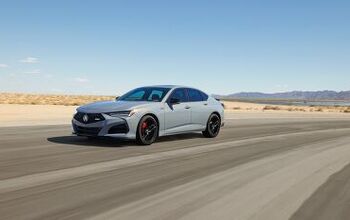Toyota Rejects Industry Lobby, Embraces CAFE
With California’s Air Resource Board and the EPA set to unleash new 2016-2025 CAFE standards, the Alliance of Automotive Manuacturers, which represents foreign and domestic automakers, is lashing out, telling Automotive News [sub]
We all want to put the most fuel-efficient vehicles as possible on the road, but for the 2017 rulemaking, policymakers still need to gather and analyze much data to determine the maximum feasible fuel economy standards that avoid negative impacts on affordability, safety, jobs and vehicle choice. No one knows what the 2025 target should be yet, and the data needs to drive the rulemaking.
But not everyone in the industry is on board with the AAM’s CAFE-skepticism. Already, Hyundai Motors USA CEO John Krafcik tells TTAC his firm plans to “Overcomply” with the coming CAFE standards, and now Toyota is joining Hyundai in breaking ranks, with Jim Colon, VP for Product Communications saying
The administration is engaged. That’s the direction Toyota is already going. Whatever goal they establish, Toyota will be prepared to meet. If it’s 62 miles a gallon, we’ll be able to achieve that.
For too long now, the auto industry has allowed itself to be seen as an enemy of emissions regulation without ever taking the initiative to propose its most viable alternative to CAFE, a gas tax. By embracing CAFE, Toyota and Hyundai are weakening industry opposition to the up-ramped standards, and in the process the two firms have carved out important marketing high ground. And with good reason: given that consumer demand tends to vary far more dramatically than fuel prices themselves, even a relatively small spike in fuel prices could have consumers demanding more vehicles that achieve CAFE minimum efficiency levels or better. In the absence of industry leadership to do anything other than drag heels and complain about interference from the government that recently saved a large sector of the industry, Toyota and Hyundai seem to be headed in a positive direction.More by Edward Niedermeyer
Latest Car Reviews
Read moreLatest Product Reviews
Read moreRecent Comments
- Redapple2 Love the wheels
- Redapple2 Good luck to them. They used to make great cars. 510. 240Z, Sentra SE-R. Maxima. Frontier.
- Joe65688619 Under Ghosn they went through the same short-term bottom-line thinking that GM did in the 80s/90s, and they have not recovered say, to their heyday in the 50s and 60s in terms of market share and innovation. Poor design decisions (a CVT in their front-wheel drive "4-Door Sports Car", model overlap in a poorly performing segment (they never needed the Altima AND the Maxima...what they needed was one vehicle with different drivetrain, including hybrid, to compete with the Accord/Camry, and decontenting their vehicles: My 2012 QX56 (I know, not a Nissan, but the same holds for the Armada) had power rear windows in the cargo area that could vent, a glass hatch on the back door that could be opened separate from the whole liftgate (in such a tall vehicle, kinda essential if you have it in a garage and want to load the trunk without having to open the garage door to make room for the lift gate), a nice driver's side folding armrest, and a few other quality-of-life details absent from my 2018 QX80. In a competitive market this attention to detai is can be the differentiator that sell cars. Now they are caught in the middle of the market, competing more with Hyundai and Kia and selling discounted vehicles near the same price points, but losing money on them. They invested also invested a lot in niche platforms. The Leaf was one of the first full EVs, but never really evolved. They misjudged the market - luxury EVs are selling, small budget models not so much. Variable compression engines offering little in terms of real-world power or tech, let a lot of complexity that is leading to higher failure rates. Aside from the Z and GT-R (low volume models), not much forced induction (whether your a fan or not, look at what Honda did with the CR-V and Acura RDX - same chassis, slap a turbo on it, make it nicer inside, and now you can sell it as a semi-premium brand with higher markup). That said, I do believe they retain the technical and engineering capability to do far better. About time management realized they need to make smarter investments and understand their markets better.
- Kwik_Shift_Pro4X Off-road fluff on vehicles that should not be off road needs to die.
- Kwik_Shift_Pro4X Saw this posted on social media; “Just bought a 2023 Tundra with the 14" screen. Let my son borrow it for the afternoon, he connected his phone to listen to his iTunes.The next day my insurance company raised my rates and added my son to my policy. The email said that a private company showed that my son drove the vehicle. He already had his own vehicle that he was insuring.My insurance company demanded he give all his insurance info and some private info for proof. He declined for privacy reasons and my insurance cancelled my policy.These new vehicles with their tech are on condition that we give up our privacy to enter their world. It's not worth it people.”


































Comments
Join the conversation
The irony is that nobody has either gut or consideration to push for the harmonisation of automotive emission regulations between the US EPA and EU. Many countries have adopted the EU regulations as the de facto standards. Even Japan and Australia who have discarded many of its "unique" regulations to harmonise with ECE and EU as to reduce the manufacturing cost and to increase the variety of models, body types, motor and gearbox choices, and so forth. China has even adopted the EU standards. While EPA and EU are very similar in scope, they disagree on the techniques of measuring the emission and procedures of certifying the vehicles. Time is now to force the United States to comply with the international de facto standards!
Let's see, Toyota, Honda and Hyundai has no problem with it. GM spent all the AD money spamming how great their highway MPGs beat Toyota models and the 200+ MPG from the Volt hybrid. SO, GM SHOULDN'T HAVE A PROBLEM WITH A NEW STANDARD THAT EVEN THE STUPID TOYOTA CAN ACHIEVE, RIGHT? As for Ford, the supporter have always claimed that Ford is superior to GM, so they have no problem. And Chrysler is supposed to have super efficient Fiat models; Nissan has leaves. Exactly who is complaining?